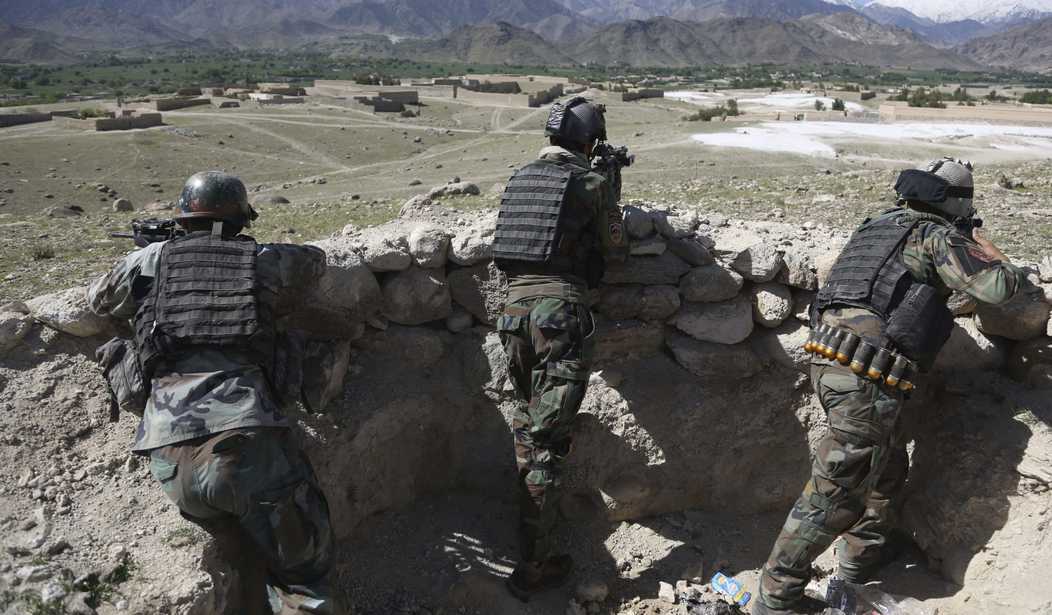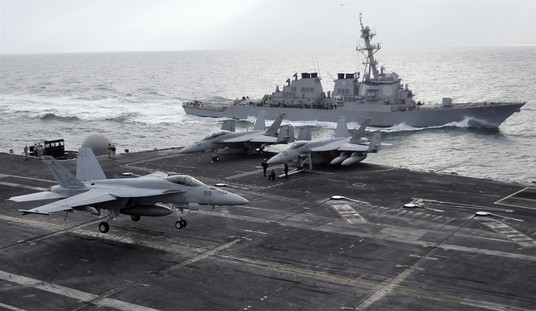The Taliban accused Washington of harming the environment and using disproportionate force against ISIS by dropping the “mother of all bombs” in Nangarhar province last week.
It was the first time the GBU-43/B Massive Ordnance Air Blast, packed with 11 tons of TNT and dropped from an MC-130, was used in combat.
The U.S. Resolute Support Mission said forces “took every precaution to avoid civilian casualties with this strike.” An Afghan army spokesman told the country’s Tolo News that one civilian family lived in the blast area, but they were evacuated by security forces before the MOAB was dropped.
“Many families had long been displaced from the area due to ISIS brutality,” said Afghanistan’s Chief Executive Abdullah Abdullah. “Government also took great care to avoid civilian harm.”
Tolo reported Tuesday that the majority of the 96 fighters killed by the MOAB in the ISIS stonghold were Tehrik-e Taliban Pakistan (TTP) and members of Pakistan-based Lashkar-e-Taiba. TTP’s attacks include the assassination of Benazir Bhutto, the shooting of Nobel laureate Malala Yousafzai, and the 2014 massacre at a Peshawar school. Lashkar-e-Taiba, which has been allied with the Afghan Taliban and al-Qaeda, was behind the 2008 Mumbai attacks.
Also reportedly among the dead: 13 ISIS commanders, 12 Tajiks, and 13 Indian nationals who had joined ISIS.
ISIS operatives are still active in other provinces including Kunar, Zabul, Ghor, Jawzjan and Sar-e-Pul, where Afghan officials say ISIS has beheaded children and torched homes.
ISIS and the Taliban called a truce last August, agreeing to stop fighting each other to both focus on fighting U.S. forces and the U.S.-backed Afghan forces.
In a statement posted on their website over the weekend, the Taliban said the “barbarity” of the Achin district MOAB drop “was followed with much fanfare with the Americans proudly boasting about it in the media thus showcasing the increasing barbarity of the foreign occupation.”
“The use and experimentation of such destructive weapons by foreign occupiers on our war-weary people and in every corner of our war-ravaged country is inexcusable,” Taliban spokesman Zabihullah Mujahid said. “The Islamic Emirate condemns such barbarity in the strongest of terms and considers its perpetrators as war criminals. Such over-proportionate use of destruction poses long-term detriments for the environment and the development of our nation.”
He added that ISIS in Afghanistan is an internal Afghan matter and “if Americans fear for their security they should foil such plots at their own borders.”
Mujahid accused the U.S. of using ISIS “as a ploy” to “experiment novel weapons and extend the illegitimate occupation.” Further, he claimed the Taliban “came close to completely eradicating this group” but their operations were stymied by U.S. bombing.
“The fact that the Americans claim that their presence in Afghanistan is limited only to a train and assist role while dropping 10 kiloton bombs on our lands only strengthens the voices of independence and jihad in our land,” he added. “…Such irresponsible actions only light the flames of vengeance and show the ugly face of foreign occupation.”
Taiban terrorist attacks this year include a car bombing that killed 7 people outside of a bank and an insider attack that killed a dozen policemen in February. In November, the Taliban claimed a suicide bombing at Bagram Airfield that killed four Americans.
The Obama administration would not call the Taliban a terrorist group, claiming they were an “armed insurgency” and encouraging the Afghan government to broker a deal with the group.
The Taliban were the first terrorist group to openly address President Trump after he won the election, telling him in November and again in December to pull out of Afghanistan or face an “incurable wound.” After the inauguration, Mujahid argued in an open letter to Trump that the previous administration erred in viewing the Taliban as “mere rebellion” instead of “a governing system,” and he should “unwaveringly accept” the “historically successful struggle” of jihadists over the past 15 years and give up the fight in Afghanistan.
Gen. John Nicholson, commander of coalition forces in Afghanistan, told a Senate panel in February that Russia has been giving support to the Taliban, who have been training with al-Qaeda.
Nicholson said “just within the last year” Russia began cozying up to the Taliban — “this has started and it was a gradual progression,” and the support continues to increase as the Kremlin is “concerned that if there’s a coalition and a U.S. presence in Afghanistan that this affects their ability to influence the Central Asian states to the north.”
Pressed on what Russia’s endgame in Afghanistan could be, Nicholson said he thinks the Kremlin’s goal is to “undermine United States and NATO.”
This month, some Afghan officials in Uruzgan province reported seeing Russian trainers among the Taliban.
National Security Advisor H.R. McMaster visited Afghanistan after the MOAB attack to help determine if the U.S. will have an increased presence in Afghanistan moving forward.









Join the conversation as a VIP Member